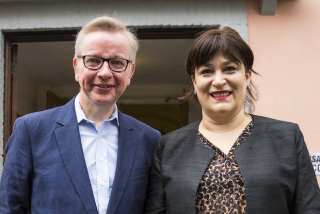The Tories' imaginary world
Sometimes, the Tories offer us a glimpse into their psychology. So it was yesterday when Sarah Vine tweeted:
Watching the #RestaurantMakesMistakes and astonished to learn that people with dementia struggle to get benefits. Is this true? And if so, how is this not a national scandal?
What she���s expressing here is the cognitive dissonance that her own party���s policies actually have nasty effects upon real people. Her consternation arises from the fact that, for many Tories, this is not supposed to happen. Many of them, I suspect, are not actually evil but rather guilty of a recklessness that comes from a particular conception of politics ��� a conception which sees it as a game of positioning, and of pandering to the imagined world of the Daily Mail. Politics is a post-modern activity in which words and appearances are everything and consequences and reality are nothing.
So for example:
- Benefit sanctions are supposed to crack down on cheats and malingerers, not real, deserving people. It is only when these appear on TV that the illusion ��� and it has been just that for years ��� is broken.
- The ���hostile environment��� policy was meant to remove illegal immigrants rather than members of the Windrush generation who are, remember, 100% British.
- Austerity was intended to establish prudent control of the nation���s finances. The fact that it has killed thousands is at best, a mere statistic, and at worst just another controversial claim.
- Brexit is about prioritizing a conception of national sovereignty over GDP. And GDP is a mere statistic, not the jobs and livelihoods of real people. What was so transgressive about Jeremy Hunt���s promise this week to shut down Titan Steel Wheels was that he broke this illusion, and linked what is supposed to be a mere abstraction to the lives of real people. 
All of this is possible because for Tories ��� at least professional ones in the media-political Bubble - politics is a reified activity separate from ground truth. Robert Protherough and John Pick have described how modern management ���deals largely in symbols and abstractions...[with] little direct contact with the organization's workers, with the production of its goods or services, or with its customers.��� For Tories, politics is like that. It���s a cosy game in which nobody is supposed to get seriously hurt: the losers only leave to get well-paid sinecures from fund management companies.
Of course, if we had a functioning media, reality would intrude. But we don���t, so it often doesn���t. The truth is difficult and complicated and in John Humphrys��� revealing words ���a wee bit technical and I���m sure people are fed up to the back teeth of all this talk of stuff most of us don���t clearly understand.��� Bubble journalists are much happier covering the Tory leadership race than they are at analysing the real-world effects of actual Tory policies - a preference which generates sympathy for charlatans rather than experts. As Tom Mills says, the BBC ���will aim to fairly and accurately reflect the balance of opinion amongst elites.��� That can efface ground truth.
The upshot is that our media-political establishment conforms to what Kenneth Boulding said (pdf) back in 1966:
All organizational structures tend to produce false images in the decision-maker, and that the larger and more authoritarian the organization, the better the chance that its top decision-makers will be operating in purely imaginary worlds.
The problem which Ms Vine discovered this week, though, is that reality has a nasty tendency to intrude occasionally into the imaginary world.
Chris Dillow's Blog
- Chris Dillow's profile
- 2 followers



